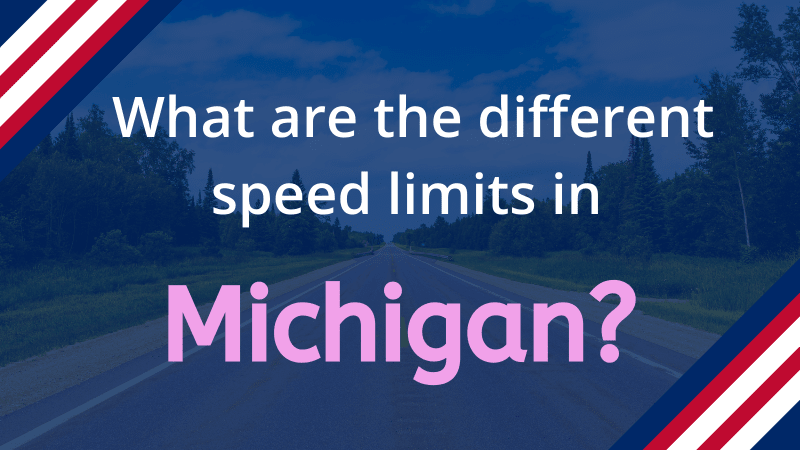Speed limits are probably the last thing that comes to mind when traveling to a beautiful place such as the U.S. state of Michigan. However, the state’s traffic authority sets out clear guidelines that must be followed to avoid getting a traffic ticket, points on your license, or, worse, jail time.
If you are moving to Michigan from another state, visiting or relocating from another country, or simply driving through the state, understanding the speed limits in Michigan is important knowledge to be aware of.

Speed limits in Michigan are established and invoked by the Michigan Department of Transportation. The speed limits in Michigan are split into two different categories, much the same as other states around the US, there is a basic speeding law, and an absolute speeding law.
Michigan’s basic speeding law requires those driving in the state to be driving at a “careful and prudent speed not greater than nor less than is reasonable and proper, having due regard to the traffic, surface, and width of the highway and of any other condition existing at the time.” The law also states that you should not drive at a speed “greater than that which will permit a stop within the assured, clear distance ahead.”
The basic Michigan speeding law in more simplified terms means that you must always drive at a safe speed, and the safe speed depends very much on the circumstances. For example, road and weather conditions. If you are driving on a day where the roads are icy due to cold weather conditions, it may result in a speeding violation to drive at the signed speed limit due to the conditions forcing you to drive at a slower speed.
Driving too slow can also be a violation of the basic speeding law. An example of this would be driving 20 mph under the Michigan speed limit on a 70 mph freeway on a sunny, dry day would be considered unreasonable and could result in you receiving a citation for driving dangerously slow.
What are the different Michigan speed limits?
The next Michigan speed limits category is absolute speed limits. These are speed limits are simple, and easy to follow as they are the Michigan speed limits that you see signposted on specific roads and in certain areas. If you are caught surpassing the absolute speed limits, then you will almost certainly receive a fine and points added to your license.
Absolute Michigan speed limits by type of road and zone
- 25 mph in business districts and school zones.
- 25 mph in residential areas.
- 25 mph within the boundaries of a public park.
- 55 mph on truck-line and county highways.
- 55 mph on gravel highways.
- 70 mph on urban freeways.
- 70 mph on rural freeways.
- 70 mph on limited-access freeways.
As you can see, the maximum speed limit you can drive in Michigan is 70 mph. Stay aware, and make sure to keep checking to see whether you are traveling at the correct and safe limit.
Penalties for breaching Michigan speed limit laws
Speeding tickets and accumulative points are a natural occurrence when you go over the designated Michigan speed limit and get caught! Your job as a safe driver is to abide by the speed limit to not only avoid fines and point penalties but to potentially save lives and prevent unnecessary accidents.
Speeding in Michigan is deemed a civil infraction. Usually, a speeding ticket will cost you up to $100 in fines and a maximum of $100 in court costs. Speeding points to be added to your license if caught speeding will vary depending on how fast you were going above the Michigan speed limit.
So, traffic violations in Michigan will be assigned a point value, in some instances, you may be offered a one-time opportunity to remove points from your record by completing what Michigan has labeled as a Basic Driver Improvement Course (BDIC). Once you have received 4 points on your record, you will receive a letter through the mail, telling you that you need to change your driving habits.
If you have 8 points on your license you will get another warning letter, and if you manage to accumulate 12 points, you will have to attend one of the several Driver Reexamination offices in the state of Michigan. Driver Reexamination agents will then review your driving record and make a decision on either revoking or suspending your driving license.
You can and will be given between 2 to 6 points on your driving license for committing a speeding offense in Michigan. If you are caught driving recklessly or under the influence, you will be given 6 points. Traveling 16 mph over the legal Michigan speed limit will result in a 4 point offense, meaning that if you are caught going 86 mph in a 70 mph zone, you will get a letter through the mail advising you to change your bad driving habits.
It is clear that road safety is of great importance to the people of Michigan. You can play your part by knowing and observing the specified maximum Michigan speed limit and various other speed limits.


